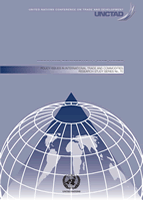
The Sustainable Development Goal (SDG) on strengthening the means of implementation and revitalizing the global partnership for sustainable development has reiterated the commitment to significantly increase the exports of Least Developed Countries (LDCs).
LDC exports potential depends on several factors, one of which is access to major markets.
This study provides an overview and analysis of G20 trade policies, in particular tariffs and non-tariff measures, and provides suggestions on how they could be improved to increase the export competitiveness of LDCs.
It finds that G20 tariffs remain restrictive in several sectors of importance for LDCs. More importantly, the results indicate that the G20 countries’ regulatory frameworks and the corresponding non-tariff measures (NTMs) alter relative competitiveness to the advantage of exporters that are capable of efficient compliance with NTMs, therefore penalizing exports originating in LDCs.
In terms of achieving SDG, the findings of this study indicate that tariff preferences should be seen as part of the approach to increase LDCs exports. However, tariff preferences alone are not sufficient, as they would produce meaningful effects only for a limited number of LDCs. Better market access through the facilitation of compliance with G20 regulatory frameworks would be essential to increase exports from LDCs.
The impact of providing LDCs with truly tariff-free market access to the G20 is quantified in an increase of exports of almost 10 billion US$, while eliminating the distortionary trade effects of NTMs would increase LDC exports to G20 countries by about 23 billion US$. Taken together LDC total exports would increase by almost 15 per cent.
While extending preferential schemes to cover 100 per cent of products and all G20 members would be straightforward, reducing the distortionary trade effects of NTMs requires a much more complex approach.
In this regard, further progress in Aid for Trade initiatives and increases in technical assistance programmes, both on bilateral and multilateral levels, to help minimize LDCs' costs of compliance with NTMs would be essential to facilitate the integration of LDCs in the global economy.



